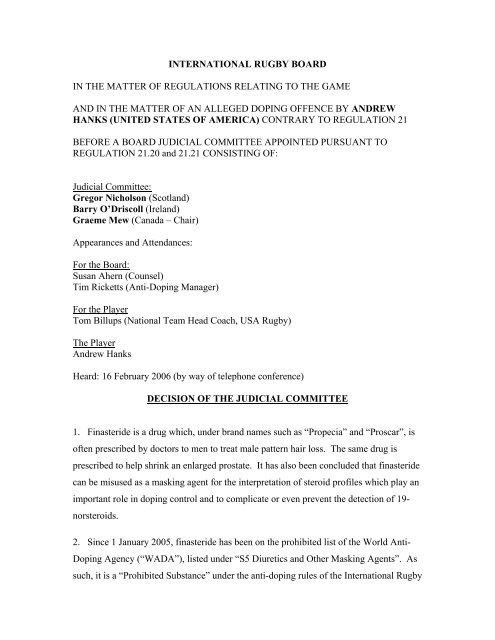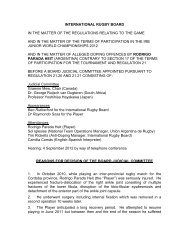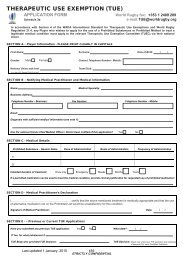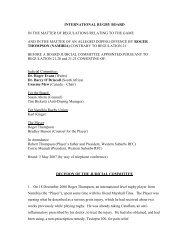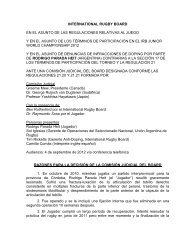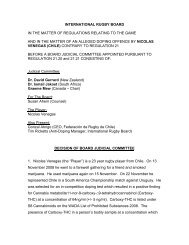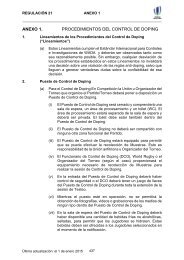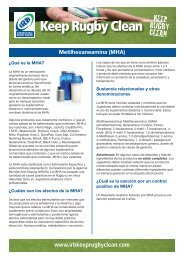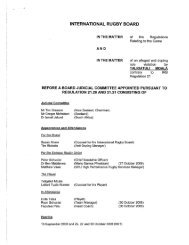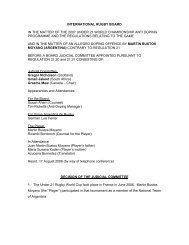matter of regulations relating - Keep Rugby Clean
matter of regulations relating - Keep Rugby Clean
matter of regulations relating - Keep Rugby Clean
Create successful ePaper yourself
Turn your PDF publications into a flip-book with our unique Google optimized e-Paper software.
INTERNATIONAL RUGBY BOARD<br />
IN THE MATTER OF REGULATIONS RELATING TO THE GAME<br />
AND IN THE MATTER OF AN ALLEGED DOPING OFFENCE BY ANDREW<br />
HANKS (UNITED STATES OF AMERICA) CONTRARY TO REGULATION 21<br />
BEFORE A BOARD JUDICIAL COMMITTEE APPOINTED PURSUANT TO<br />
REGULATION 21.20 and 21.21 CONSISTING OF:<br />
Judicial Committee:<br />
Gregor Nicholson (Scotland)<br />
Barry O’Driscoll (Ireland)<br />
Graeme Mew (Canada – Chair)<br />
Appearances and Attendances:<br />
For the Board:<br />
Susan Ahern (Counsel)<br />
Tim Ricketts (Anti-Doping Manager)<br />
For the Player<br />
Tom Billups (National Team Head Coach, USA <strong>Rugby</strong>)<br />
The Player<br />
Andrew Hanks<br />
Heard: 16 February 2006 (by way <strong>of</strong> telephone conference)<br />
DECISION OF THE JUDICIAL COMMITTEE<br />
1. Finasteride is a drug which, under brand names such as “Propecia” and “Proscar”, is<br />
<strong>of</strong>ten prescribed by doctors to men to treat male pattern hair loss. The same drug is<br />
prescribed to help shrink an enlarged prostate. It has also been concluded that finasteride<br />
can be misused as a masking agent for the interpretation <strong>of</strong> steroid pr<strong>of</strong>iles which play an<br />
important role in doping control and to complicate or even prevent the detection <strong>of</strong> 19norsteroids.<br />
2. Since 1 January 2005, finasteride has been on the prohibited list <strong>of</strong> the World Anti-<br />
Doping Agency (“WADA”), listed under “S5 Diuretics and Other Masking Agents”. As<br />
such, it is a “Prohibited Substance” under the anti-doping rules <strong>of</strong> the International <strong>Rugby</strong>
Board (the “Board”), which are contained in Regulation 21 <strong>of</strong> the Regulations Relating to<br />
the Game.<br />
3. Andrew Hanks (the “Player”) is an up-and-coming 23 year-old American rugby<br />
player. He plays rugby for the University <strong>of</strong> California Golden Bears and is currently in<br />
his final year <strong>of</strong> undergraduate studies. In June 2005, the Player was selected as a<br />
member <strong>of</strong> the USA Sevens squad to compete at the World Games in Duisburg,<br />
Germany, in July 2005. This was the Player’s first international selection.<br />
4. The USA Sevens squad assembled in New York in July 2005 to prepare for the<br />
World Games tournament. On 17 July, the Player injured his knee in training. Although<br />
he subsequently travelled to Germany with the USA squad, he did not, because <strong>of</strong> injury,<br />
play at the World Games.<br />
5. While he has yet to play representative rugby for the USA’s 15-a-side or sevens<br />
teams, by virtue <strong>of</strong> his selection for the World Games, the Player became part <strong>of</strong> the<br />
Registered Testing Pool <strong>of</strong> International Players subject to out <strong>of</strong> competition drug testing<br />
by the Board.<br />
6. On 8 November 2005, the Player was randomly selected for out <strong>of</strong> competition<br />
testing. He was required to provide a urine specimen to a doping control <strong>of</strong>ficer. In the<br />
Doping Control Form which he completed, the Player declared that he was using Proscar<br />
and daily vitamins.<br />
7. The Player’s urine specimen was divided into “A” and “B” samples and sent to the<br />
WADA accredited laboratory in Montreal, Canada. The laboratory’s certificate <strong>of</strong><br />
analysis <strong>of</strong> the “A” sample indicated a positive test for the presence <strong>of</strong> finasteride in the<br />
Player’s urine sample.<br />
8. The Board has no record <strong>of</strong> a Therapeutic Use Exemption (“TUE”) on file for the<br />
Player for the use <strong>of</strong> this substance.<br />
- 2 -
9. Following a preliminary review undertaken pursuant to Regulation 21.20.1, the<br />
results <strong>of</strong> the positive test were subsequently communicated to the Player via USA <strong>Rugby</strong><br />
and the Player was provisionally suspended effective 28 December 2005.<br />
10. The Player was given the option <strong>of</strong> having the “B” sample <strong>of</strong> his specimen analysed,<br />
but advised USA <strong>Rugby</strong> that he acknowledged “that the medication was found” and that<br />
he did not wish to have the “B” sample analysed.<br />
11. Letters were written to USA <strong>Rugby</strong> by Dr. L.G. Hilger (4 January 2006) and by Dr.<br />
Warren King, the Medical Director <strong>of</strong> USA <strong>Rugby</strong> (10 January 2006). Dr. Hilger wrote<br />
that he had been treating the Player for early male pattern hair loss since August 2003 and<br />
that he had, at that time, placed him on propecia. The treatment was evidently successful<br />
and the Player continued to use the medication, as prescribed by Dr. Hilger. He<br />
continued:<br />
I was unaware that propecia (finasteride) was banned, and I believe Andrew was<br />
also. The drug was prescribed by me, in good faith, over the last 2⅓ years, at the<br />
doses above [1mg daily], for a recognized condition and consistent with FDA<br />
indications and dosages. There certainly was no intent by the patient or myself to<br />
seek unfair competitive advantage, only a better anterior hairline! The patient …<br />
has discontinued use <strong>of</strong> finasteride.<br />
12. Dr. King, after outlining the clinical uses <strong>of</strong> Proscar, expresses the opinion that<br />
Proscar would, in fact, block the effects <strong>of</strong> testosterone on improving performance<br />
abilities and notes that as <strong>of</strong> 1999, Proscar was not banned by either the NCAA (the<br />
National Collegiate Athletic Association) or the United States Olympic Committee. He<br />
concludes that, having regards to the information available, there is no evidence<br />
indicating that there were any performance-enhancing effects <strong>of</strong> this medication. He goes<br />
on to say:<br />
… Andrew Hanks’ use <strong>of</strong> Proscar does not appear to be based on a desire to<br />
enhance performance, but a desire to prevent male pattern baldness. The drug<br />
was prescribed by a physician who was ignorant to the fact that the medication<br />
- 3 -
itself was banned by the International <strong>Rugby</strong> Board. Based on the known<br />
metabolic effects <strong>of</strong> Proscar, it is unlikely that Andrew Hanks' use <strong>of</strong> Proscar<br />
enhanced his athletic ability and <strong>of</strong>fered him an unfair advantage over competitors<br />
not using the medication. There is no evidence that Andrew Hanks was<br />
knowledgeable that the use <strong>of</strong> this medication was banned by the International<br />
<strong>Rugby</strong> Board, and there is no evidence that Andrew Hanks attempted to conceal<br />
or hide the fact that he was using this agent. In addition, the fact that this agent<br />
was not banned by either the International Olympic Committee or the NCAA as<br />
recently as 1999 further substantiates its minimal effects regarding performance<br />
enhancement.<br />
13. By a letter to the Player (via the Union) dated 26 January 2006, the Player was<br />
informed that a Board Judicial Committee (“BJC”) would be appointed to consider his<br />
case, that it was proposed that the BJC should meet by way <strong>of</strong> telephone conference and<br />
that he would be given the opportunity to make any submissions and to present any<br />
evidence which he believed to be relevant to his case, including any mitigating factors<br />
and that he could do so by being present on the conference call and/or by making a<br />
written submission in advance.<br />
14. The Player elected to participate in the hearing before the BJC by telephone and was<br />
subsequently notified <strong>of</strong> the hearing details. The National Team Head Coach <strong>of</strong> USA<br />
<strong>Rugby</strong> also participated in the hearing. In addition to the oral evidence and submissions<br />
provided at the hearing, the BJC also considered the documents placed before it,<br />
including the following:<br />
a) Preliminary Review Report<br />
b) Laboratory Analysis Report<br />
c) Doping Control Form<br />
d) Letter from the Player to the Board dated 16 December 2005<br />
e) Memorandum from USA <strong>Rugby</strong> to the Board dated 28 December 2005<br />
f) Email from the Player to USA <strong>Rugby</strong> dated 12 January 2006<br />
g) Letter from Dr. L.G. Hilger dated 4 January 2006<br />
- 4 -
h) Letter from Dr. Warren King dated 10 January 2006<br />
i) News Release from U.S. Anti-Doping Agency dated 23 January 2006 (“U.S.<br />
Bobsled and Skeleton Athlete Accepts Public Warning for Doping Violation”)<br />
j) Sports Illustrated article dated 23 January 2006 (“Lund given doping warning –<br />
Skeleton racer will compete in Turin amid suspicion”)<br />
k) Sports Illustrated article dated 23 January 2006 (“Skeleton coach cleared –<br />
Nardiello reinstated after suspension is overturned”)<br />
l) Information <strong>relating</strong> to Finasteride (Proscar, Propecia)<br />
m) Synopsis “Investigation about the effects and the detection <strong>of</strong> finasteride”<br />
(http://www.dshs-koeln.de/biochemie/rubriken/00_home/00_fin.pdf)<br />
n) Bundle <strong>of</strong> email correspondence between the Board and the Union<br />
15. The hearing was conducted by telephone conference on 16 February 2006.<br />
Subsequent to the hearing the panel requested and received further information from the<br />
Board and from USA <strong>Rugby</strong> concerning the dissemination <strong>of</strong> certain information <strong>relating</strong><br />
to the anti-doping programmes <strong>of</strong> the Board and <strong>of</strong> USA <strong>Rugby</strong>.<br />
Anti-Doping Rule Violation Established<br />
16. At the outset <strong>of</strong> the hearing the Player confirmed his admission that he had used a<br />
Prohibited Substance. Accordingly, we are satisfied that the Player has committed an<br />
Anti-Doping Rule Violation due to the presence <strong>of</strong> a Prohibited Substance, namely<br />
finasteride, in the Player’s urine sample.<br />
The Player’s Account<br />
17. The Player’s account is a straightforward one.<br />
18. He started playing rugby in high school and has continued playing at university. He<br />
takes his rugby seriously and, but for his current provisional suspension, had been<br />
looking forward to the University competitive season in the spring <strong>of</strong> 2006 and to further<br />
opportunities to represent his country. He has never previously been drug-tested and had,<br />
- 5 -
prior to this incident, received no anti-doping education from either USA <strong>Rugby</strong> or from<br />
his university. In particular, he had never been provided with a list <strong>of</strong> banned substances.<br />
19. The Player acknowledged his general awareness that the use <strong>of</strong> prohibited substances<br />
is not tolerated in rugby but he had no idea that finasteride was a banned substance. Nor<br />
did the doctor who prescribed finasteride to treat the Player’s premature hair loss. The<br />
Player was also unaware <strong>of</strong> the option <strong>of</strong> applying for a Therapeutic Use Exemption in<br />
connection with his use <strong>of</strong> finasteride for therapeutic purposes.<br />
20. Although he had not been told that he was part <strong>of</strong> the Registered Testing Pool subject<br />
to out <strong>of</strong> competition testing by the Board, the Player did not, seemingly, have any<br />
concerns when he was selected for random drug testing. He disclosed his use <strong>of</strong> Proscar<br />
on the Doping Control Form which he completed at the time he provided his urine<br />
sample.<br />
21. The Player said that he had started taking finasteride in August 2003 and had<br />
continued doing so until becoming aware <strong>of</strong> the positive analysis following the drug<br />
testing which occurred in November 2005. He has not taken finasteride since then and<br />
now understood why it was a banned substance.<br />
The Union’s Perspective<br />
22. Tom Billups, the National Team Head Coach for USA <strong>Rugby</strong> spoke in support <strong>of</strong> the<br />
Player.<br />
23. Until the beginning <strong>of</strong> 2006, there was no doping information on the website <strong>of</strong> USA<br />
<strong>Rugby</strong>. During the time frame material to this <strong>matter</strong>, no information was disseminated<br />
by USA <strong>Rugby</strong> to its territorial unions, teams, clubs, players or player support personnel<br />
concerning either doping issues generally or the list <strong>of</strong> Prohibited Substances in<br />
particular.<br />
24. Mr. Billups acknowledged that at the material time, USA <strong>Rugby</strong> had no formulated<br />
system in place to check medication use by national level players to ensure that such use<br />
was consistent with USA <strong>Rugby</strong>'s anti-doping policy. While he agreed that this was<br />
- 6 -
egrettable, he felt that the Player's positive test was, in the totality <strong>of</strong> things, nothing<br />
more than a result <strong>of</strong> a lack <strong>of</strong> staffing, funding and institutional control by USA <strong>Rugby</strong>.<br />
25. Mr. Billups noted that the Player had become part <strong>of</strong> the drug testing pool by virtue <strong>of</strong><br />
his selection for USA sevens squad for the World Games, but that, as a result <strong>of</strong> injury,<br />
the Player had not, in fact, played at the World Games. While he understood why<br />
finasteride is now on the prohibited list, he felt that the serious concerns <strong>relating</strong> to<br />
steroid abuse and cheating stood in contrast to the therapeutic use <strong>of</strong> a substance for<br />
treatment <strong>of</strong> hair loss. USA <strong>Rugby</strong> has confirmed that the Player had not, prior to being<br />
tested, been informed <strong>of</strong> his inclusion in the Registered Testing Pool.<br />
26. A review <strong>of</strong> the website <strong>of</strong> USA <strong>Rugby</strong> demonstrates an awareness <strong>of</strong> and a<br />
commitment to the comprehensive anti-doping programme <strong>of</strong> the Board. For example, a<br />
press release dated 21 March 2005 announcing a partnership between the USA <strong>Rugby</strong><br />
and the Positive Coaching Alliance states:<br />
Aligned with PCA principles and driven by rugby's culture <strong>of</strong> fair play, USA<br />
<strong>Rugby</strong> boasts one <strong>of</strong> the most comprehensive anti-doping <strong>regulations</strong> in American<br />
sport, with pr<strong>of</strong>essionals and amateurs competing in full compliance with the<br />
World Anti Doping Agency (WADA) and International Olympic Committee<br />
(IOC). <strong>Rugby</strong>'s ethos and tough policies on doping help make it one <strong>of</strong> the<br />
cleanest sports in the world at all levels, a unique attribute among highly<br />
pr<strong>of</strong>essional sports that demand extraordinary strength and stamina. Last summer<br />
USA <strong>Rugby</strong> joined the International <strong>Rugby</strong> Board (IRB) in adopting a<br />
comprehensive anti doping policy to ensure the sport continues to grow and<br />
develop in a drug free environment. In 2005 the testing program will be expanded<br />
with almost 1,000 anti doping tests conducted by the IRB both in and out <strong>of</strong><br />
competition.<br />
27. Mr. Billups candidly acknowledged that USA <strong>Rugby</strong> had failed to get the Player up<br />
to speed with current anti-doping <strong>regulations</strong>. When asked what the position was with<br />
respect to participation by US teams in tournaments such as the World Sevens Series, Mr<br />
Billups noted that the US currently participates in only three stops on the IRB circuit and<br />
- 7 -
that such a level <strong>of</strong> participation does not automatically correlate to the provision <strong>of</strong><br />
educational programmes on anti-doping to the players.<br />
28. Making reference to press clippings <strong>relating</strong> to the Lund case (which involved an<br />
American athlete in the sport <strong>of</strong> skeleton who had tested positive for finasteride), Mr.<br />
Billups noted that, in contrast to Mr. Lund, the Player had not had a long history <strong>of</strong><br />
exposure to drug testing and information concerning the use <strong>of</strong> banned substances. As a<br />
result, Mr. Billups felt that there had been no fault or negligence on the Player's part.<br />
29. Mr. Billups informed the BJC that, since becoming aware <strong>of</strong> the Player's positive test,<br />
USA <strong>Rugby</strong> had taken steps to improve player awareness <strong>of</strong> anti-doping issues through<br />
website information and the implementation <strong>of</strong> a formal anti-doping educational<br />
programme. USA <strong>Rugby</strong> has confirmed that once the website information was posted,<br />
the national team players were sent an email informing them <strong>of</strong> their responsibilities<br />
regarding this information.<br />
The Board’s Perspective<br />
30. The Board’s submissions emphasised the principle <strong>of</strong> a Player’s strict liability for<br />
anti-doping violations. The Board’s Anti-Doping Manager confirmed that up-to-date<br />
doping information was at all material times available on the Board’s website and that the<br />
Board had sent a circular to all Unions providing information on changes to the 2005 list<br />
<strong>of</strong> Prohibited Substances.<br />
Anti-Doping Rule Violations<br />
31. Any Player at any level <strong>of</strong> the Game is subject to the anti-doping rules contained in<br />
Regulation 21. Under Regulation 21.2.1, the “presence <strong>of</strong> a Prohibited Substance or its<br />
Metabolites or Markers in a Player’s bodily Sample” constitutes an anti-doping rule<br />
violation.<br />
32. Regulation 21.22.1 provides, in respect <strong>of</strong> sanctions:<br />
Except for the specified substances identified in Regulation 21.22.2, the period <strong>of</strong><br />
Ineligibility imposed for a violation <strong>of</strong> Regulation 21.2.1 (presence <strong>of</strong> Prohibited<br />
- 8 -
Substance or its Metabolites or Markers), Regulation 21.2.2 (Use or Attempted<br />
Use <strong>of</strong> Prohibited Substance or Prohibited Method) and Regulation 21.2.6<br />
(Possession <strong>of</strong> Prohibited Substances and Methods) shall be:<br />
First violation: Two (2) years' Ineligibility.<br />
Second violation: Lifetime Ineligibility.<br />
However, the Player or other Person shall have the opportunity in each case,<br />
before a period <strong>of</strong> Ineligibility is imposed, to establish the basis for eliminating or<br />
reducing this sanction as provided in Regulation 21.22.4.<br />
33. It was confirmed that this is the Player’s first anti-doping rule violation.<br />
34. Regulation 21.22.4 contains provisions for the elimination or reduction <strong>of</strong> a period <strong>of</strong><br />
Ineligibility based on “Exceptional Circumstances”.<br />
35. Two categories <strong>of</strong> exceptional circumstances are identified. In the first, if a Player<br />
can establish that he “bears No Fault or Negligence for the violation” and can establish<br />
how the Prohibited Substance entered his system, the period <strong>of</strong> Ineligibility can be<br />
eliminated. “No Fault or Negligence” means:<br />
The Player’s establishing that he did not know or suspect, and could not<br />
reasonably have known or suspected even with the exercise <strong>of</strong> utmost caution,<br />
that he had used or been administered the Prohibited Substance.<br />
36. The second category is where the Player “bears No Significant Fault or Negligence”<br />
in which case the period <strong>of</strong> Ineligibility may be reduced, but the reduced period <strong>of</strong><br />
Ineligibility may not be less than one-half <strong>of</strong> the minimum period <strong>of</strong> Ineligibility<br />
otherwise applicable. The definition <strong>of</strong> the term provides:<br />
The Player’s establishing that his fault or negligence, when viewed in the totality<br />
<strong>of</strong> the circumstances and taking into account the criteria for No Fault or<br />
Negligence, was not significant in relationship to an antidoping rule violation.<br />
37. A footnote to the corresponding provision <strong>of</strong> the WADA Code makes it clear that<br />
only in truly exceptional cases and not in the vast majority <strong>of</strong> cases will these provisions<br />
operate to eliminate or reduce a sanction. An example <strong>of</strong> where the elimination <strong>of</strong> a<br />
sanction might be justified would be where a Player was sabotaged by a competitor. The<br />
administration <strong>of</strong> a Prohibited Substance by an athlete’s personal physician without<br />
- 9 -
disclosure to the athlete, in circumstances where the athlete had told the doctor that he<br />
could not be given any Prohibited Substance could, depending on the unique facts and<br />
circumstances <strong>of</strong> a particular case, result in a reduced sanction. 1<br />
Sanctions<br />
38. The anti-doping regimes under Regulation 21 and under the WADA code are based<br />
on the principles <strong>of</strong> personal responsibility and strict liability for the presence <strong>of</strong><br />
Prohibited Substances or the use <strong>of</strong> Prohibited Methods. Regulation 21.6 addresses the<br />
principle <strong>of</strong> personal responsibility and provides:<br />
21.6.1 It is each Players responsibility to ensure that no Prohibited Substance is<br />
found to be present in his body and that Prohibited Methods are not Used. It is<br />
also the personal responsibility <strong>of</strong> each Player to ensure that he does not commit<br />
any other anti-doping rule violation.<br />
21.6.2 It is the sole responsibility <strong>of</strong> each Player and Person to acquaint himself<br />
with all <strong>of</strong> the provisions <strong>of</strong> these Anti-Doping Regulations including the<br />
Guidelines. It is also each Player’s sole responsibility to notify Player Support<br />
Personnel, including, but not limited to, their doctors <strong>of</strong> their obligation not to use<br />
Prohibited Substances and Prohibited Methods and to ensure that any medical<br />
1 The commentary to Article 10.5 <strong>of</strong> the WADA Code provides:<br />
To illustrate the operation <strong>of</strong> Article 10.5, an example where No Fault or Negligence would result<br />
in the total elimination <strong>of</strong> a sanction is where an Athlete could prove that, despite all due care, he<br />
or she was sabotaged by a competitor. Conversely, a sanction could not be completely eliminated<br />
on the basis <strong>of</strong> No Fault or Negligence in the following circumstances: (a) a positive test resulting<br />
from a mislabeled or contaminated vitamin or nutritional supplement (Athletes are responsible for<br />
what they ingest (Article 2.1.1) and have been warned against the possibility <strong>of</strong> supplement<br />
contamination); (b) the administration <strong>of</strong> a prohibited substance by the Athlete’s personal<br />
physician or trainer without disclosure to the Athlete (Athletes are responsible for their choice <strong>of</strong><br />
medical personnel and for advising medical personnel that they cannot be given any prohibited<br />
substance); and (c) sabotage <strong>of</strong> the Athlete’s food or drink by a spouse, coach or other person<br />
within the Athlete’s circle <strong>of</strong> associates (Athletes are responsible for what they ingest and for the<br />
conduct <strong>of</strong> those persons to whom they entrust access to their food and drink). However,<br />
depending on the unique facts <strong>of</strong> a particular case, any <strong>of</strong> the referenced illustrations could result<br />
in a reduced sanction based on No Significant Fault or Negligence. (For example, reduction may<br />
well be appropriate in illustration (a) if the Athlete clearly establishes that the cause <strong>of</strong> the positive<br />
test was contamination in a common multiple vitamin purchased from a source with no connection<br />
to Prohibited Substances and the Athlete exercised care in not taking other nutritional<br />
supplements.)<br />
- 10 -
treatment received by them does not violate any <strong>of</strong> the provisions <strong>of</strong> these<br />
Regulations.<br />
21.6.3 Many <strong>of</strong> the substances in the Prohibited List may appear either alone or as<br />
part <strong>of</strong> a mixture within medications or supplements which may be available with<br />
or without a doctor’s prescription. Any Player who is concerned about the<br />
appropriateness <strong>of</strong> treatment being administered to him, or medications or<br />
supplements being ingested by him, should seek clarification from his doctor or<br />
other relevant authority as to whether such treatment is or such medications are<br />
prohibited.<br />
39. We accept that the Player did not knowingly commit a doping <strong>of</strong>fence. Use <strong>of</strong><br />
finasteride over a period <strong>of</strong> three or more years would be inconsistent with the use <strong>of</strong> that<br />
substance as a masking agent. We also note that finasteride was not a prohibited<br />
substance when the Player started taking it. As already noted, finasteride was not<br />
included in the WADA prohibited list until 1 January 2005. Although the Board<br />
provided information to Unions concerning changes to the WADA prohibited list, this<br />
information does not appear to have filtered its way through to the Player and his<br />
physician or, for that <strong>matter</strong>, to Mr. Billups or Dr. King. The Player had never consulted,<br />
or thought to consult, the comprehensive anti-doping information available on the<br />
Board’s website (http://www.irb.com/Playing/Anti+Doping/) and the USA <strong>Rugby</strong><br />
website at the time contained no anti-doping educational information.<br />
40. Unions also have responsibilities under the Regulations. In particular, Regulation<br />
21.14.2 provides that:<br />
Each Union must ensure, (and is responsible for ensuring), that it takes<br />
appropriate action to inform each and every one <strong>of</strong> its members, Players and<br />
Persons <strong>of</strong> these Anti-Doping Regulations and the Union’s anti-doping<br />
<strong>regulations</strong>. Unions must further inform their members, Players and Persons that<br />
they must comply with the Board’s Anti-Doping Regulations and the anti-doping<br />
<strong>regulations</strong> <strong>of</strong> the Union under whose jurisdiction they are participating.<br />
- 11 -
41. There is no question that in this case, as in some other doping cases that Board<br />
Judicial Committees have dealt with, there has been a significant failure on the Union’s<br />
part to fulfill its responsibilities. The Player would be fully justified in concluding that<br />
his Union has failed him. This is particularly so because the effect <strong>of</strong> the rules regarding<br />
personal responsibility and strict liability is that the athlete typically takes the full brunt,<br />
in terms <strong>of</strong> the sanctions resulting from the failure by Unions to implement adequate<br />
programmes to inform and educate players, coaches and other player support personnel<br />
on anti-doping issues and to ensure that up-to-date information concerning Prohibited<br />
Substances and Prohibited Methods is disseminated. Until the Board takes more<br />
proactive steps to call Unions to account for failing to comply with Regulation 21.14.2,<br />
avoidable incidents such as this will continue to occur.<br />
42. The attitude <strong>of</strong> player support personnel such as Dr. King is, in our view,<br />
symptomatic <strong>of</strong> the problem. Instead <strong>of</strong> acknowledging, as Mr. Billups did, that the real<br />
problem lay with his own failure, as well as that <strong>of</strong> USA <strong>Rugby</strong>, to keep up to date with<br />
anti-doping rule developments and changes to the list <strong>of</strong> Prohibited Substances, Dr. King<br />
sought to excuse the Player’s infraction on the grounds that, inter alia, as recently as<br />
1999 the NCAA and the US Olympic Committee did not ban Proscar. We find Dr<br />
King’s submission at best disappointing and at worst ignorant. Regulation 21, as noted,<br />
applies to each Union, and a Union’s own anti-doping <strong>regulations</strong> must conform to<br />
Regulation 21. There was no suggestion before us that USA <strong>Rugby</strong>’s anti-doping<br />
<strong>regulations</strong> are inconsistent with Regulation 21. Furthermore, we note that the US<br />
Olympic Committee has adopted and applied WADA standards and, therefore, that<br />
finasteride has, since 1 January 2005, been a banned substance in sports under the<br />
jurisdiction <strong>of</strong> the USOC. It is surprising that the medical director <strong>of</strong> a national rugby<br />
Union <strong>of</strong> the standing and stature <strong>of</strong> USA <strong>Rugby</strong> would not know this.<br />
43. Notwithstanding the failings <strong>of</strong> USA <strong>Rugby</strong> and its player support personnel, we are<br />
bound to impose a period <strong>of</strong> ineligibility <strong>of</strong> two years unless we are satisfied that the<br />
Player has established, on a balance <strong>of</strong> probability, that he bore “No Fault or Negligence<br />
for the violation” or that he bore “No Significant Fault or Negligence”.<br />
- 12 -
44. The Player and the Union ask that we exercise leniency in his case. The Player has<br />
fully cooperated with the Board in its inquiry into this <strong>matter</strong> and with the BJC in respect<br />
<strong>of</strong> the conduct <strong>of</strong> this hearing.<br />
45. While all <strong>of</strong> the factors discussed above might be regarded as mitigating<br />
circumstances, we are required to look at the criteria in Regulation 21.22.4 <strong>relating</strong> to the<br />
elimination or reduction <strong>of</strong> the otherwise applicable period <strong>of</strong> ineligibility based on<br />
exceptional circumstances.<br />
46. To clearly establish that he bore No Fault or Negligence, the Player would have to<br />
demonstrate that he took all due care to prevent this violation.<br />
47. With respect to the question <strong>of</strong> whether the Player bears “No Significant Fault or<br />
Negligence”, we have to view the totality <strong>of</strong> the circumstances, taking into account the<br />
criteria for No Fault or Negligence (i.e. whether the Player knew or suspected, and could<br />
not reasonably have known or suspected even with the exercise <strong>of</strong> utmost caution, that he<br />
had used or been administered the Prohibited Substance), and then conclude that the<br />
Player’s fault or negligence was not significant in relationship to the antidoping rule<br />
violation.<br />
48. A prerequisite to a consideration <strong>of</strong> exceptional circumstances, whether it be in the<br />
context <strong>of</strong> determining whether the Player bore “No Fault or Negligence” or “No<br />
Significant Fault or Negligence”, is that that the “Player must also establish how the<br />
Prohibited Substance entered his system” in order to have the period <strong>of</strong> ineligibility<br />
reduced or eliminated (Regulation 21.22.4).<br />
49. In this regard, we adopt the rationale and the principles expressed by an independent<br />
anti-doping tribunal <strong>of</strong> the International Tennis Federation in the case <strong>of</strong> Roy Mariano<br />
Hood (8 February 2006) in which it was said:<br />
The purpose <strong>of</strong> this provision is to confine the circumstances in which the<br />
automatic sanctions may be reduced to truly exceptional circumstances in which<br />
the player can show, the burden <strong>of</strong> pro<strong>of</strong> lying upon him, how the substance did<br />
indeed enter his body. That burden <strong>of</strong> pro<strong>of</strong> must be discharged on the balance <strong>of</strong><br />
- 13 -
probability. The provision thus ensures that mere protestations <strong>of</strong> innocence, and<br />
disavowal <strong>of</strong> motive or opportunity, by a player, however persuasively asserted,<br />
will not serve to engage these provisions if there remains any doubt as to how the<br />
prohibited substance entered his body. This provision is necessary to ensure that<br />
the fundamental principle that the player is personally responsible for ensuring<br />
that no prohibited substance enters his body is not undermined by an application<br />
<strong>of</strong> the mitigating provisions in the normal run <strong>of</strong> cases.<br />
50. Noting that the player in question had clearly established that his positive test resulted<br />
from his use <strong>of</strong> finasteride for which a Therapeutic Use Exemption could have (but had<br />
not) been applied for, the tribunal in Hood noted that establishing the cause <strong>of</strong> the<br />
positive test does not necessarily make the circumstances <strong>of</strong> the case exceptional. Rather,<br />
by establishing how the substance entered his system, the athlete satisfies a precondition<br />
for the application <strong>of</strong> the exceptional circumstances provisions.<br />
51. The tribunal in Hood continued:<br />
No fault or negligence requires the player to show the utmost caution, that is that<br />
he had taken all the necessary precautions within his power to ensure that a<br />
doping <strong>of</strong>fence could not be committed. It is not a standard <strong>of</strong> negligence, in the<br />
sense <strong>of</strong> requiring only reasonable care to have been taken. On the other hand the<br />
standard <strong>of</strong> the paradigm must not be set at such a level that it is practically<br />
unattainable or unrealistic. If the player fails to meet that very high standard he<br />
may be regarded as having borne some fault, but it may not be “significant”. That<br />
word in its context connotes a lack <strong>of</strong> serious or substantial moral fault or<br />
blameworthiness, so that the rigorous application <strong>of</strong> these very strict anti-doping<br />
rules is tempered in the case <strong>of</strong> an excusable and understandable failure to have<br />
foreseen or prevented the doping <strong>of</strong>fence where the conduct <strong>of</strong> the player was not<br />
particularly culpable, but failed to meet the standard <strong>of</strong> utmost caution. In either<br />
case, no fault or no significant fault, the circumstances have to be truly<br />
exceptional. Again these exceptions have to be restrictively applied to prevent the<br />
principle <strong>of</strong> strict liability being eroded, so that the exception becomes the norm.<br />
- 14 -
52. The fault <strong>of</strong> the Player is, to a considerable extent, understandable. The<br />
circumstances in which he ingested finasteride are clear and no competitive advantage<br />
was sought or gained. There was no evidence, as there was in the Hood case, that the<br />
Player had checked the prohibited list when he started to take finasteride (which was not<br />
a Prohibited Substance at the time) and thereafter assumed that its continued use was<br />
permissible: in the Player’s case he had never turned his mind to whether finasteride was<br />
a prohibited substance. Nor is there an indication, as was the situation in the Hood case<br />
and in the case <strong>of</strong> Zachery Lund (Court <strong>of</strong> Arbitration for Sport case no: CAS OG 06/001,<br />
10 February 2006) that the Player had been advised to check the prohibited list each year<br />
but had failed to do so: the Player had received little or no anti-doping information at all.<br />
53. These findings stand against the requirement that it is each athlete’s personal duty to<br />
ensure that no Prohibited Substance enters his or her body and that athletes are<br />
responsible for any Prohibited Substance found in their bodily specimen. Ignorance <strong>of</strong><br />
the rules is not a defence. The athlete must establish either that he did not know or<br />
suspect or that he could not reasonably have known or suspected, even with the exercise<br />
<strong>of</strong> utmost caution, that he was using a Prohibited Substance.<br />
54. Short <strong>of</strong> sabotage, the undisclosed administration <strong>of</strong> a Prohibited Substance by a<br />
personal physician, or some similar circumstance entirely beyond an athlete’s control, it<br />
will rarely, if ever, be possible for an athlete to establish that he or she bears “No Fault or<br />
Negligence”. Accordingly, although we have considerable sympathy for the Player in<br />
this case, we cannot conclude that he has, on a balance <strong>of</strong> probability, established “No<br />
Fault or Negligence” and thus cannot reduce or eliminate the otherwise applicable<br />
sanction on that basis.<br />
55. We are, however, persuaded that the Player bears “No Significant Fault or<br />
Negligence” for the presence <strong>of</strong> finasteride in his urine sample. As already noted, he was<br />
prescribed finasteride for therapeutic treatment <strong>of</strong> premature hair loss at a time when<br />
finasteride was not a prohibited substance. The Player only achieved international<br />
selection for the first time in June 2005 and has yet to actually play for his country. He<br />
- 15 -
did not know he was part <strong>of</strong> the Board’s Registered Testing Pool and he had received<br />
little or no anti-doping education or information.<br />
56. While we find that, it was negligent for the Player to fail to take any steps to ensure<br />
that his use <strong>of</strong> finasteride would not transgress Regulation 21, when viewing all <strong>of</strong> the<br />
circumstances (and taking into account the standard that the Player did not know or<br />
suspect, or could not reasonably have known or suspected even with the exercise <strong>of</strong><br />
utmost care, that he had used or been administered a Prohibited Substance), the Player’s<br />
negligence was not, in our view, significant in relationship to the Player’s anti-doping<br />
rule violation.<br />
57. Regulation 21.22.4(b) permits us to reduce the Player’s period <strong>of</strong> ineligibility by up to<br />
one half <strong>of</strong> the minimum period <strong>of</strong> ineligibility otherwise applicable, which, for this<br />
infraction, is two years. In the circumstances <strong>of</strong> this case we are <strong>of</strong> the view that the<br />
Player’s period <strong>of</strong> ineligibility should be reduced by the maximum permitted to one year.<br />
58. The Judicial Committee is entitled to take into account any period <strong>of</strong> Provisional<br />
Suspension and to credit it against the total period <strong>of</strong> ineligibility to be served. It is<br />
appropriate that we do so in this case. The Player will therefore remain suspended up to<br />
and including 27 December 2006. During that time he will be subject to the conditions <strong>of</strong><br />
ineligibility provided in Regulation 21.22.7. 2<br />
59. If the Board wishes us to exercise our discretion in relation to costs pursuant to<br />
Regulation 21.21.9, written submissions should be provided to the Judicial Committee<br />
and to the Player by 17:00 Dublin time on 21 April 2006, with any written submissions<br />
by the Player in response to be provided to the Board (which shall be responsible for<br />
2 For avoidance <strong>of</strong> doubt, Regulation 21.22.7 provides:<br />
No Player or Person who has been declared Ineligible may, during the period <strong>of</strong> Ineligibility,<br />
participate in any capacity in a Match, Series <strong>of</strong> Matches and/or Tournament (international or<br />
otherwise) or activity (other than authorised anti-doping education or rehabilitation programs)<br />
authorised or organised by the Board or any Member Union. Such participation includes but is<br />
not limited to coaching, <strong>of</strong>ficiating, selection, team management, administration or promotion<br />
<strong>of</strong> the Game, playing, training as part <strong>of</strong> a team or squad, or involvement in the Game in any<br />
other capacity in any Union in membership <strong>of</strong> the IRB. In addition, for any anti-doping rule<br />
violation not involving specified substances described in Regulation 21.22.2, some or all sportrelated<br />
financial support or other sport-related benefits received by such Player or Person will<br />
be withheld by the Board and its Member Unions.<br />
- 16 -
forwarding such submissions on to the Judicial Committee) by no later than 17:00 Dublin<br />
time on 28 April 2006.<br />
60. The Player’s right to appeal this decision to the Court <strong>of</strong> Arbitration for Sport is<br />
provided for by Regulation 21.27.2. In this regard attention is also directed to the Code<br />
<strong>of</strong> Sports-related Arbitration (http://www.tas-cas.org/en/code/frmco.htm) and, in<br />
particular Rule 49 there<strong>of</strong> which provides that in the absence <strong>of</strong> any other applicable time<br />
limit, the time limit for appeal shall be twenty-one days from the receipt <strong>of</strong> the decision<br />
appealed against.<br />
13 April 2006<br />
Graeme Mew (for and on behalf <strong>of</strong> the Board Judicial Committee)<br />
Gregor Nicholson<br />
Barry O’Driscoll<br />
- 17 -


